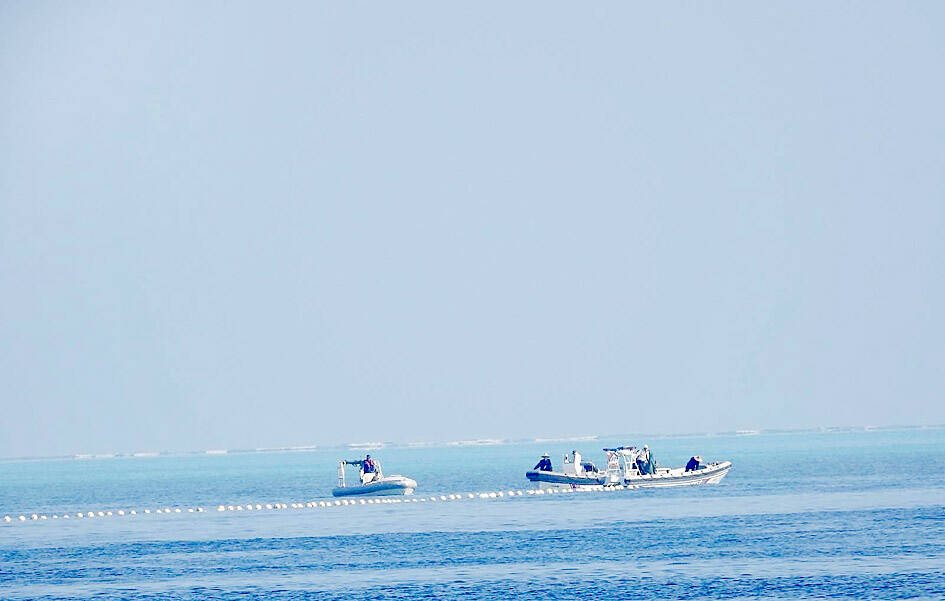Beijing yesterday warned Manila not to “stir up trouble” after the Philippine Coast Guard said it removed a floating barrier at a disputed reef that was allegedly deployed by China to block Filipino fishers from the area.
Scarborough Shoal (Huangyan Island, 黃岩島) in the South China Sea has long been a source of tension between the nations. China seized the ring of reefs from the Philippines in 2012 and has since deployed patrol boats.
The latest spat was sparked by a 300m floating barrier that was found across the entrance of the shoal last week during a routine Philippine government resupply mission to fishers plying the waters near the shoal.

Photo: EPA-EFE
The Philippines condemned the installation and its coast guard announced on Monday that it had “successfully” removed the barrier from the reef, which Manila calls Bajo de Masinloc, in a special operation ordered by Philippine President Ferdinand Marcos Jr.
The Philippine Coast Guard yesterday said that it had cut a rope tethering the buoys to an anchor on the seabed, and hauled away the anchor, which allowed the line to drift.
Chinese Ministry of Foreign Affairs spokesman Wang Wenbin (汪文斌) hit back yesterday, saying that Beijing “firmly upholds the sovereignty and maritime rights and interests of the Huangyan Island.”
“We advise the Philippines not to provoke or stir up trouble,” Wang said.
Philippine National Security Adviser Eduardo Ano said his nation was “well within its rights” to remove any barrier at the reef.
China claims sovereignty over almost the entire South China Sea, despite a 2016 international court ruling that its stance has no legal basis.
The shoal, which Taiwan also claims, is 240km west of the Philippines’ main island of Luzon and nearly 900km from the nearest major Chinese land mass of Hainan.
Under the 1982 UN Convention on the Law of the Sea, which China helped negotiate, nations have jurisdiction over the natural resources within about 200 nautical miles (370km) of their shore.
The Philippine Coast Guard on Monday released a video showing a man wearing snorkeling gear using a knife to sever a rope attached to white buoys, while another showed an anchor being hauled from the water into a wooden outrigger boat.
After the rope was cut, the Chinese government removed the barrier, Jay Tarriela, Philippine Coast Guard spokesman for the West Philippine Sea, told reporters yesterday.
The floating barrier had prevented fishing boats from entering the shoal’s shallow waters, where fish are more abundant.
Philippine officials previously accused the Chinese Coast Guard of installing the barrier before a Philippine Bureau of Fisheries and Aquatic Resources resupply ship arrived at the shoal on Wednesday last week.
The Philippine Ministry of Foreign Affairs on Monday said that it would “take all appropriate measures to protect our country’s sovereignty and the livelihood of our fisherfolk,” without elaborating.

DAREDEVIL: Honnold said it had always been a dream of his to climb Taipei 101, while a Netflix producer said the skyscraper was ‘a real icon of this country’ US climber Alex Honnold yesterday took on Taiwan’s tallest building, becoming the first person to scale Taipei 101 without a rope, harness or safety net. Hundreds of spectators gathered at the base of the 101-story skyscraper to watch Honnold, 40, embark on his daredevil feat, which was also broadcast live on Netflix. Dressed in a red T-shirt and yellow custom-made climbing shoes, Honnold swiftly moved up the southeast face of the glass and steel building. At one point, he stepped onto a platform midway up to wave down at fans and onlookers who were taking photos. People watching from inside

A Vietnamese migrant worker yesterday won NT$12 million (US$379,627) on a Lunar New Year scratch card in Kaohsiung as part of Taiwan Lottery Co’s (台灣彩券) “NT$12 Million Grand Fortune” (1200萬大吉利) game. The man was the first top-prize winner of the new game launched on Jan. 6 to mark the Lunar New Year. Three Vietnamese migrant workers visited a Taiwan Lottery shop on Xinyue Street in Kaohsiung’s Gangshan District (崗山), a store representative said. The player bought multiple tickets and, after winning nothing, held the final lottery ticket in one hand and rubbed the store’s statue of the Maitreya Buddha’s belly with the other,

Japan’s strategic alliance with the US would collapse if Tokyo were to turn away from a conflict in Taiwan, Japanese Prime Minister Sanae Takaichi said yesterday, but distanced herself from previous comments that suggested a possible military response in such an event. Takaichi expressed her latest views on a nationally broadcast TV program late on Monday, where an opposition party leader criticized her for igniting tensions with China with the earlier remarks. Ties between Japan and China have sunk to the worst level in years after Takaichi said in November that a hypothetical Chinese attack on Taiwan could bring about a Japanese

‘COMMITTED TO DETERRENCE’: Washington would stand by its allies, but it can only help as much as countries help themselves, Raymond Greene said The US is committed to deterrence in the first island chain, but it should not bear the burden alone, as “freedom is not free,” American Institute in Taiwan Director Raymond Greene said in a speech at the Institute for National Defense and Security Research’s “Strengthening Resilience: Defense as the Engine of Development” seminar in Taipei yesterday. In the speech, titled “Investing Together and a Secure and Prosperous Future,” Greene highlighted the contributions of US President Donald Trump’s administration to Taiwan’s defense efforts, including the establishment of supply chains for drones and autonomous systems, offers of security assistance and the expansion of